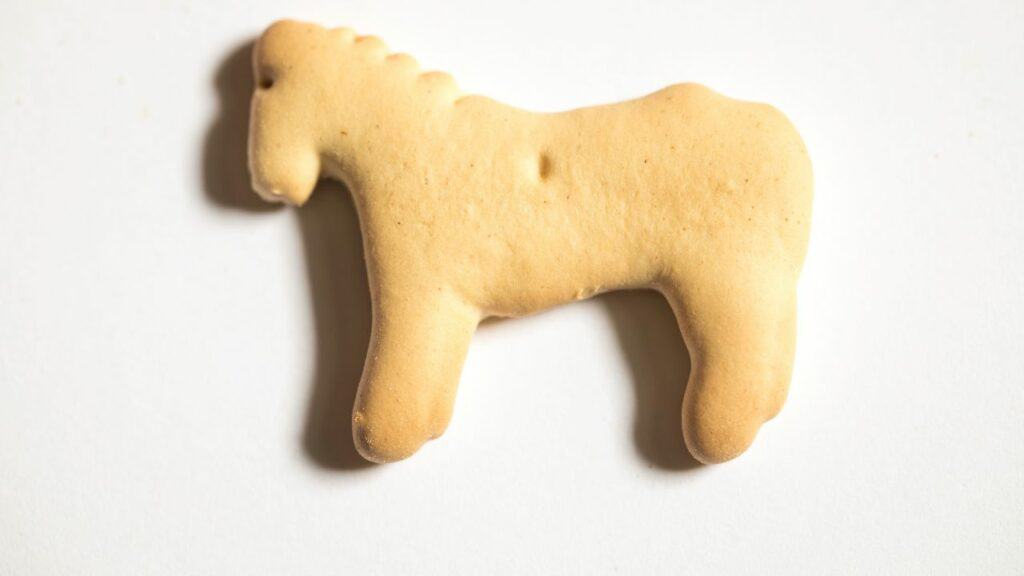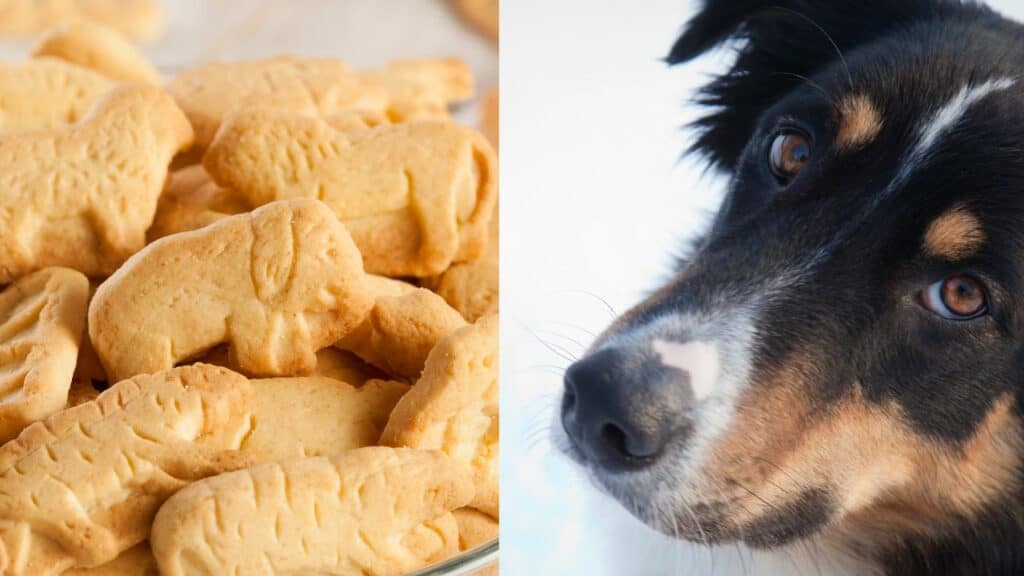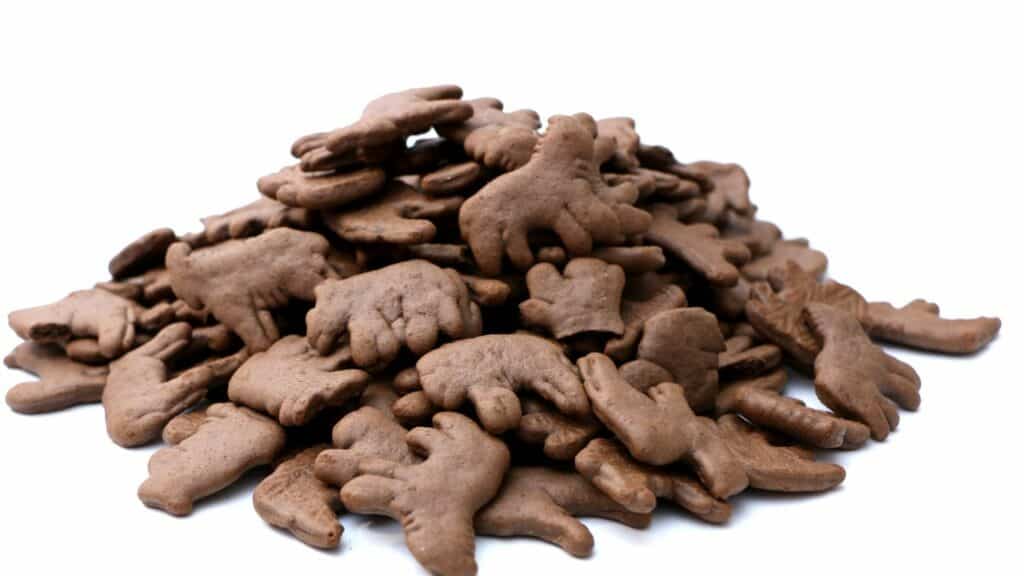You can always count on finding a jar of Animal Crackers when you enter a house with kids.
These tiny cookies are as fun to eat as they appear and come in various fun animal shapes.
Consuming this tasty snack these days is very enjoyable for both children and adults.
Can dogs eat Animal Crackers?
No, dogs should not eat Animal Crackers because they contain high amounts of sugar, salt, calories, and carbohydrates.
Ensure the Animal Crackers are plain and free of xylitol, other sweeteners, or chocolate.
You can safely give your dogs an occasional treat of one Animal Cracker if you must.
Animal Crackers are typically not a good choice for dogs to eat because they contain unhealthy substances, including sugar, salt, spices, and the type of oil used.
These components can make dogs gain weight, develop diabetes, have joint discomfort or arthritis, develop heart disease or cancer, or even salt poisoning.
Lined up for you today is everything you’ve ever wanted to know about feeding dogs Animal Crackers – Are Animal Crackers okay for dogs to eat?
What Are Animal Crackers Made From?

The fundamental ingredients for Animal Crackers are flour, sugar (or corn syrup), water, hydrogenated vegetable oil, baking soda, salt, and lecithin (an emulsifier).
They are more similar to standard cookies or Nilla wafers in terms of ingredients.
Enriched flour includes:
Wheat flour, niacin
Reduced iron
Thiamine mononitrate (Vitamin B1)
Riboflavin (Vitamin B2)
Folic acid
Sugar
Soybean oil
High fructose corn syrup
Salt
Baking soda for leavening
Soy lecithin is used as an emulsifier.
Natural flavor
Spice
Why Are Animal Crackers Bad For Dogs?

Salt Animal Crackers may seem like a good dog treat, but they’re not the best option because they have little nutritional value.
What you’ll find in a pack of crackers:
Carbohydrates
Most crackers are high in calories due to their high carbohydrate content
Obesity or weight gain might result from eating too many crackers
Animal Crackers, for instance, are calorie-free and provide minimal nutrients for your pet
Fats
Some crackers, like cheese crackers, are detrimental to your dog’s health because they are high in fats and oils.
These lipids may cause digestive distress or conditions like pancreatitis.
Peanut butter crackers are too heavy in fat for dogs, although natural peanut butter is okay for them in moderation.
Seasonings
Many crackers feature flavors like chives, onion powder, or garlic powder that are hazardous to your pet.
These harmful chemicals might cause stomach distress or significant health problems.
Enriched Flour
One of the critical components of Animal Crackers is wheat flour.
Keep Animal Crackers away from your furry family members if they are allergic to wheat products or sensitive to them.
We strongly advise speaking with your veterinarian or bringing your dog in for a checkup if you’re unsure whether your dog is allergic to wheat or not.
Your veterinarian can determine your dog’s allergy through a battery of testing.
Remember that your dog might not have a wheat allergy from birth.
Wheat or food allergies are most commonly brought on by prolonged exposure to wheat-based goods.
Signs and symptoms of wheat allergy include:
Diarrhea
Vomiting
Bloating
Red, itchy, or inflamed skin
Skin rashes
Sneezing
Licking of the paw pads or front paws
Itchy bottoms
Asthma
Seizure
High In Sugar
Crackers are sweet as a human snack because of the sugar, but they are harmful to dogs.
Sugar consumption might result in problems like diabetes or weight gain.
Additionally, graham plain crackers and other sweet crackers could contain the hazardous dog’s artificial sweetener xylitol.

Soybean Oil
Dogs cannot be poisoned or harmed by soybean oil, but it does contain more saturated fat than other vegetable oils.
Our dogs should not consume saturated fats.
However, soybean oil is not one of the many oils that are suitable for dogs.
Additionally dangerous to dogs with soy allergies is soybean oil.
For these reasons, it’s recommended to consider using one of the oils above instead of soybean oil when making dog treats.
High In Salt
Large amounts of saltine crackers might cause health risks like dehydration or excessive urination.
Sodium poisoning can also result from sodium concentration.
Lethargy, vomiting, and diarrhea are some signs of salt toxicity in dogs.
Baking Soda
Baking soda is not necessary for a dog’s diet.
Giving baking soda to your furry friend is likewise not a brilliant idea.
Small amounts of baking soda should not harm dogs, but if your dog eats a lot of it, you should take him to the doctor.
Soy Lecithin
Lecithin is generally safe for dogs because it helps with immunity, vitamin absorption, and digestion.
Both young and older dogs got health benefits from lecithin.
Lecithin can aid with memory and learning in young dogs.
Senior dogs’ skin irritations and inflammation can also be relieved by lecithin.
For dogs with soy allergy, soy lecithin may be dangerous.
Do not give your dog food containing soy lecithin if they have a soy allergy.
Many contend that soy lecithin is a waste product and a toxic ingredient in pet food.
It is claimed that if an item on the nutritional label is complicated for you to pronounce, it is probably not beneficial.
Spices Such As Nutmeg And Mace

Animal Crackers’ distinctive flavor comes from the added nutmeg and mace spices.
In excessive quantities, the nutmeg spice is toxic to dogs.
Because it contains the toxin myristicin, nutmeg and nutmeg spices should generally be kept out of reach of dogs. Include myristicin.
The amount of nutmeg spice in Animal Crackers is unknown, although around 5 grams is considered hazardous to dogs.
Dogs who consume too much nutmeg may have the following symptoms:
Dehydration and frequent urination
Upset stomach.
Increased heart rate
Seizures
High blood pressure
Disorientation
Disruption in the nervous system
Similarly to nutmeg, mace is a spice that comes from the same plant, so dogs should not consume it.
It’s suggested to give your dog no more than 2 to 3 Animal Crackers for these reasons.
What Happens If A Dog Eats Animal Crackers?
Animal crackers are poisonous to dogs because they contain casein, a plant protein similar to milk, in highly concentrated proportions.
The digestive system’s protein breakdown damages the dog’s kidneys and liver.
However, due to the high levels of calcium and other minerals in their urine and feces, dogs who consume a lot of Animal Crackers may have vomiting, diarrhea, or dehydration.
These symptoms could be fatal if a veterinarian is not consulted right away.
Animal cracker consumption in dogs can also cause convulsions or shock due to fluid and blood loss during vomiting.
Muscle tremors, convulsions, and tremors are further symptoms.
What would happen if a dog ate Animal Crackers?
Can dogs eat Animal Crackers?
Dogs enjoy Animal Crackers.
Many dogs enjoy it as a tasty treat, and pet parents enjoy it.
These grain-free goodies for your “canine buddy” can be a decent alternative to the most often consumed Animal Crackers composed of beef and pig.
Conclusion: Can Dogs Eat Animal Crackers?

Ideally, Animal Crackers shouldn’t be eaten by our canine friends.
They are harmful to dogs since they are too much salt, sugar, fat, and carbohydrates.
It’s okay to occasionally indulge in two or three Animal Crackers as a rare treat, but frequent ingestion is harmful.
The food they eat and the amount of exercise they get significantly impact our dog’s health.
Keeping Animal Crackers away from small dog breeds and sedentary dogs is preferable.
As you can see, a little dog’s health might be negatively impacted by bad snacks or food.
Our canine companions will consume anything and everything that is offered to them, including food that is unsafe or unhealthy for them.
Therefore, dog owners mustn’t feel bad about not feeding their dogs snacks.
I advise speaking with your veterinarian about any concerns you may have about your dog consuming Animal Crackers in order to ensure the safety of your pet.
Before You Go…
Now you know the answer to the question, “Can dogs eat animal cracker?”.
If you want to learn more, read the following articles too!


